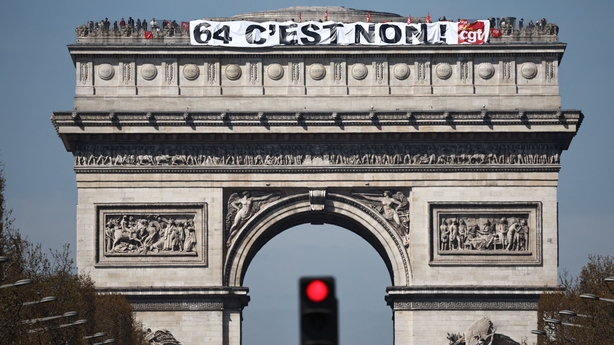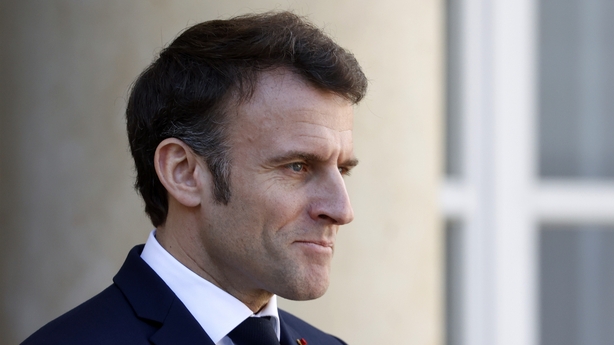French presidents tackle pension reform at their peril.
Successive occupants of the Elysée Palace have tried, but then shied away from reforms following massive street protests and strikes.
Jacques Chirac tried and failed to introduce reforms in 1995 and was turfed out by voters 18 months later.
Prime Minister Dominique de Villepin had to withdraw new labour reforms even after they were signed into law following nationwide protests in 2006.
Emmanuel Macron has set out to buck the trend.
Yesterday unions held an abortive meeting with prime minister Elizabeth Borne which lasted less than an hour.
In simple terms, they want the reforms withdrawn, and Mr Macron's government has refused.
If the Constitutional Council gives the plans the go ahead on 14 April they will pass into law.
But the crisis is expected to persist: Mr Macron’s use of a presidential decree to sidestep a vote in the Assemblée Nationale sharply escalated the sense of outrage on the streets and observers are now talking about a democratic crisis.

74% of working age income
Mr Macron tried the first raft of reforms after coming to power in 2017 and faced huge protests and the longest transport strike in French history just two years later.
He postponed most of the changes due to the pandemic, but following his re-election last year he has vowed to press ahead, arguing that the pensions system is unsustainable as the population ages and people live longer.
He has argued that the best and simplest path to fiscal correction is to raise the minimum pension age from 62 to 64 and to streamline 42 different pension systems for various sectors of the workforce.
France spends 14% of its GDP on public pensions, double the OECD average.
French people continue to receive roughly 74% of their working age income when they retire.
The government argues that this is not sustainable. French employees generate their pension through a pay-as-you go system, but Mr Macron argues there are fewer and fewer workers per pensioner and that the budget deficit will explode if things carry on.
In 2000 there were 2.1 employees paying for every pensioner, but that fell to 1.7 in 2020 and will fall to 1.2 by 2070.
Read more: Mass protests in France over pension reform
'Cosseted, well-funded retirements'
However, experts argue that Mr Macron's reforms unfairly target lower and middle income groups, especially those who start work earlier in life but who have had an interrupted employment path.
Although French people are thought to enjoy cosseted, well-funded retirements, Bruno Palier, research director at the Sciences Po Centre for European Studies and Comparative Politics, says there are mistaken perceptions.
Age 62 is the minimum level at which French people retire, he says, but many French workers do not qualify for their full pension until 67, the same as in many other European countries.
The problem facing lower income groups, he says, is that employers often fire them before they reach 62 as they are too expensive to employ, or, especially among working class women, they have fragmented careers which disqualify them for a full pension until later in life.
Currently, French workers must work 42 years and two months in order to qualify for a full pension.
The reforms will see that rise to 43 years by 2030.
For every year a French employee works below that number, they will lose 5% of their pension.

'Not because the French are lazy'
"It’s not because the French are lazy," says Professor Palier.
"It’s because in France work has been intensifying tremendously, partly because there are fewer people in the labour market, especially aged people.
"A lot of them are sacked before the pension age and those who remain have to work harder, they have to work more intensely."
This, says Prof Palier, is not specific to France. Similar resentments against the intensification of work have bubbled to the surface across the developed world, especially following the Covid pandemic.
"People want better remuneration, more acknowledgement of their contribution, better recognition of their work," says Prof Palier.
The reforms, he says, will not hit higher income workers as badly.
"High income people are high-skilled, they start their working lives later, they know they can only retire at a minimum at 64 because of these reforms, but they know that they are less likely to be laid off, and they are in good shape," Prof Palier said.
"They are ready for it."
What makes this pensions confrontation different from earlier flashpoints is the political system under Mr Macron.
Over two stunning electoral victories Mr Macron carved out a previously indistinct middle ground, trashing the old party system of the socialists and centre right.
However, having lost a majority in the legislative elections in 2022, Mr Macron has to work harder to build alliances on individual issues.
In short, the space and mood for social compromise that might facilitate pension reform is not there.
"Mr Macron's legacy could be shattered if his railroad approach is followed through"
That is why Mr Macron used Article 49.3 of the constitution to force the issue through without a vote in the Assemblee Nationale.
It is not unheard of - the decree has been used 100 times since it was introduced by Charles De Gaulle - but in the current inflamed moment it enraged protestors and unions who say Macron has debased democracy (on 20 March the French president’s government did win two no-confidence votes, despite the use of Article 49.3).

However, Mr Macron’s legacy could be shattered if his railroad approach is followed through, since the very cohort worst hit by the reforms are most likely to vote for the radical populist Rassemblement National (RN) under Marine Le Pen.
"This is exactly the electorate of the radical populist right," says Professor Palier. "This is the lower middle class who voted for Brexit, for the RN in France. This is what the polls are showing."
The far right in France has been inching closer to power for the past two decades.
In 2002, Jacques Chirac enjoyed a margin of 20 million votes over Le Pen’s father Jean-Marie, the former leader of the far right.
In 2017, the gap between Mr Macron and Marine Le Pen was 10 million, but last year the margin was down to just five million votes.
A Le Pen victory in 2027 would have huge implications for the European Union as well as France.
For the moment, Mr Macron appears to be banking on public anger dissipating and resignation setting in.
However, the eight unions have united around the issue and opinion polls show a solid 80% opposed to the reforms.
"The government hopes for resignation to take over," says Prof Palier, "but if resignation could turn to resentment, that will turn to protest, that could turn to violence."







